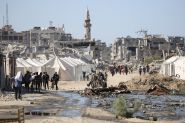- Home
- Middle East
- Tensions Mount as Washington Delays and Israel Threatens Iran

©Al Markazia
President Donald Trump announced on Wednesday that he had asked Israeli Prime Minister Benjamin Netanyahu to delay any potential military action against Iran, in order to give the United States administration more time to negotiate a new nuclear agreement with Tehran.
Iran’s nuclear program lies at the center of an escalating diplomatic standoff between Washington and Tel Aviv. While Tehran insists its nuclear activities are purely civilian, the US remains cautious, but open to renewed talks over the future of Iran’s uranium enrichment.
The fifth round of nuclear talks between Iranian Foreign Minister Abbas Araghchi and US Special Envoy to the Middle East Steve Witkoff concluded last week in Rome with mixed results. “There was progress, but nothing definitive,” said the Omani mediator overseeing the negotiations.
No date or location has yet been set for the next round of discussions.
Israel Ready to Strike as Washington Races to Preserve Diplomacy
Tel Aviv’s impatience is growing. Netanyahu has openly threatened to attack Iran’s nuclear sites, even if the US reaches a diplomatic agreement with Tehran. According to a New York Times report published on Wednesday, this escalation has raised concerns within the Trump administration.
Israeli media reported on Friday that the Israeli military is accelerating preparations for a possible strike on Iran’s nuclear infrastructure.
US intelligence agencies estimate Israel could launch an attack within seven hours of a direct order from Netanyahu, leaving Washington little time to intervene or de-escalate.
For President Trump, the risks are twofold: the collapse of negotiations with Tehran and the opening of a new conflict in the Middle East.
Adding to the pressure, Saudi King Salman bin Abdulaziz reportedly delivered a stark warning to Iran’s Supreme Leader, Ayatollah Ali Khamenei, via Prince Khaled bin Salman, who visited Tehran on April 17. The message was clear: secure a nuclear deal or face an Israeli strike.
Uranium Enrichment at the Core of Nuclear Talks
Iran’s uranium enrichment capability remains the core issue of the diplomatic standoff. Tehran claims this right under the Treaty on the Non-Proliferation of nuclear weapons (NPT), a claim Washington strongly rejects. The Trump administration now demands a complete halt to Iran’s enrichment program.
For the US, any civilian nuclear program in Iran must exclude on-site uranium enrichment to prevent Tehran from developing nuclear weapons. “Iran can have a civilian nuclear program like other countries, but enriched uranium must be imported,” stated Secretary of State Marco Rubio in April.
Tehran regards this demand as maximalist and refuses to comply. “Enrichment will continue, with or without an agreement,” declared Iranian negotiator Araghchi. On May 20, Supreme Leader Khamenei responded, “No one in Iran awaits their permission. The Islamic Republic has its own policies and will steadfastly follow them.”
Faced with this deadlock, US diplomats are considering a compromise allowing a strictly controlled civilian nuclear program under enhanced inspections, in exchange for a slowdown in enrichment activities.
President Trump hinted that tangible proposals had been offered to Tehran, but Mohammad Eslami, the head of Iran’s Atomic Energy Organization, categorically denied it. Nonetheless, Eslami expressed willingness to cooperate with the International Atomic Energy Agency (IAEA), potentially including American inspectors, should an agreement be reached.
Meanwhile, Iran’s Foreign Ministry stated that Tehran does not intend to temporarily suspend uranium enrichment as part of any deal with the US.
Israel remains firm in its opposition. On May 11, Foreign Minister Gideon Saar stressed the necessity of dismantling Iran’s uranium enrichment sites. Israel fears Washington might soften its stance to secure an agreement with Tehran, prompting Netanyahu’s warning that “a bad deal is worse than no deal at all,” emphasizing that any concession on enrichment is unacceptable.
Negotiations at a Crossroads
Tensions remain high as diplomacy struggles to contain threats of military action. Israel is determined to prevent the Islamic Republic from making any military nuclear advancements, while Tehran promises retaliation. Meanwhile, the US is working to preserve a fragile dialogue aimed at avoiding escalation.
“Whatever happens, we must ensure that Iran does not acquire nuclear weapons,” said Prime Minister Netanyahu in an official statement on April 17.
Read more




Comments